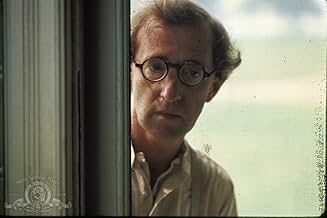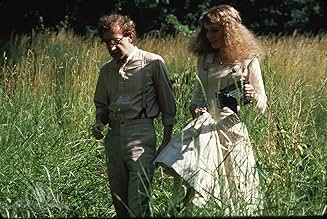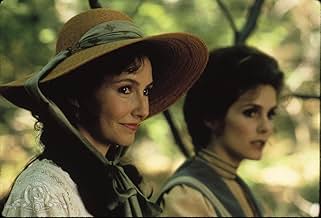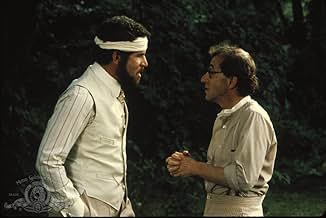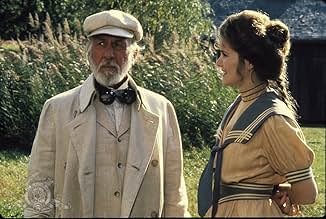Una commedia sexy in una notte di mezza estate
Titolo originale: A Midsummer Night's Sex Comedy
VALUTAZIONE IMDb
6,6/10
21.602
LA TUA VALUTAZIONE
Uno stravagante inventore e sua moglie invitano altre due coppie per una festa del fine settimana in una romantica casa estiva nella campagna del 1900.Uno stravagante inventore e sua moglie invitano altre due coppie per una festa del fine settimana in una romantica casa estiva nella campagna del 1900.Uno stravagante inventore e sua moglie invitano altre due coppie per una festa del fine settimana in una romantica casa estiva nella campagna del 1900.
- Regia
- Sceneggiatura
- Star
- Premi
- 1 candidatura in totale
José Ferrer
- Leopold
- (as Jose Ferrer)
Sandy Biano
- Nurse
- (non citato nei titoli originali)
Caitlin O'Heaney
- Dolores Farrar
- (non citato nei titoli originali)
Recensioni in evidenza
I thought this was really quite good. Had not seen before as is never really mentioned or advertised. Particularly enjoyed Julie Hagerty's performance. I don't know why she has not been a bigger star and more used in films. Her timing and line delivery is very funny. Jose Ferrer also excellent at his pompous best. Mia farrow and Mary Steenbergen both look lovely in the summer drenched locations, that look like one of Englands Southern Shire Counties! Perhaps not Woody Allens best, but as he apparently 'hates' the country side, some gorgeous scenes filmed by Gordon Willis. I have given this a '7'rating, and would certainly recommend to all.
A MIDSUMMER NIGHT'S SEX COMEDY was Woody Allen's amusing variation on the Ingmar Bergman classic SMILES OF A SUMMER NIGHT, which had been previously re-worked as a Broadway musical by Stephen Sondheim called A LITTLE NIGHT MUSIC. This film is about three couples in turn of the century who gather at one of their country homes for the weekend and it is clear at the beginning of the story that these three couples are hopelessly mismatched and we see the very human foibles that split up and mix up these three couples during this memorable weekend in the country. Woody and Mary Steenburgen plays the hosts for the weekend, a seemingly happily married couple whose happiness is clearly surface deep. Tony Roberts plays a womanizing physician and Woody's best pal who arrives for the weekend with his nurse (Julia Hagerty). In her first screen pairing with Woody Allen, Mia Farrow plays a former flame of Woody's who has arrived with her much older fiancée (Jose Ferrer) who she is scheduled to marry on Monday. Watching these three couples fuss and fumble all over each other in an attempt to be with the person they really want to be with is what makes this charming period comedy work. As always in Woody's films, music is crucial in setting the mood and Woody has chosen some classic Mendelsohhn pieces that set the perfect mood for the piece. The performances are uniformly fine, with Roberts a standout. Not one of Woody's better known films, but if you'd like to see where his relationship with Mia began, take a look.
When I saw this film I thought it was from Allen's early period and I thought of it as a prototype Manhattan but when I checked the chronology I discovered that it belongs to his middle period and postdates both Annie Hall and Manhattan. It really is like Manhattan set in the woods of New England. As far as I can see, it is his first film with Mia Farrow and his camera is besotted with her as are all the male characters in the film. Mary Steeburgen also looks good although I can never work out whether she really can act or whether she is just having trouble with her contact lenses. The scenes of New England are beautifully shot and are ravishing to look at. I thought the element of mysticism sat uneasily with the rest of the film.
This film is said to be Allen's take on the Bergman film Three Smiles of a Summer Night although I cannot comment on this because I last saw the Bergman film 35 years ago at a student film society. Maybe the mystical element in Allen's film is lifted from Bergman. There are also obvious parallels with A Midsummer Night's Dream with the mortals swapping partners and with spirits flitting about in the woods. In keeping with the subject matter, Allen uses Mendelssohn for the incidental music rather that his usual classic jazz numbers.
This film is said to be Allen's take on the Bergman film Three Smiles of a Summer Night although I cannot comment on this because I last saw the Bergman film 35 years ago at a student film society. Maybe the mystical element in Allen's film is lifted from Bergman. There are also obvious parallels with A Midsummer Night's Dream with the mortals swapping partners and with spirits flitting about in the woods. In keeping with the subject matter, Allen uses Mendelssohn for the incidental music rather that his usual classic jazz numbers.
Despite being one of Woody's lesser works this film still succeeds to entertain. The sight of Woody on a flying bicycle is worth watching the film alone, as is the wonderful scenery. Despite not having an outstanding script, though good by anyone else's standards, Woody's take on Bergman & Shakespeare's tale is a success that makes the summer seem like a magical time of escapism and hope. Woody succeeds in the modern take on the Shakespearian theme of confusion & love and manages to make a warm and pleasant film
When I look at his filmography on this site and count the films I consider great from the 70s till the early 90s I only stumble over two or three entries I am not fond of. Granted, some are greater than others, but Woody Allen essentially created consistently excellent films for two decades. Whether comedy or drama, whether set in New York or elsewhere, his films are not only great American films, but they belong in the international arena of film art.
Having said all that, and hopefully having disclosed my own bias in discussing the man's work, I can say without further ado that I loved "A Midsummer Night's Sex Comedy." It is hardly the type of Woody Allen film that would receive dozens of critical accolades and nominations (in fact it was only nominated for a Razzie), but I think that can be explained by the fact that Woody Allen set a bar of expectation for himself. When you watch "Manhattan" or "Crimes and Misdemeanors" and then this you see a change of pace, a sort of lighter tone. That does not, however, mean that this film is without its merits. Taken strictly as a film, not as a Woody Allen film, it is plain wonderful. I think that goes for most of his films (except maybe some of the more recent ones).
Allen, of course, is up to his usual tricks again - he takes a Bergman film ("Smiles of a Summer Night") and spoofs it, makes it his own and I think successfully. The atmosphere of this film is what makes it so watchable - the beautiful blend of humor, nostalgia and unfulfilled desire, which I think he perfected in "Radio Days," come through exquisitely. It's also an interesting move away from the stark atheism, or at least agnosticism of his earlier films - the presence of spirits, shadows and ghosts, things unexplained by science, unaccounted for by our sentient experience.
The most interesting aspect of it is that this mystical theme is hardly incongruous with Allen's other films, including his tragedies. Whether his films underline the hopelessness of existence (like "Interiors") or the mystical, and thus hopeful nature of human relationships, they only differ by the mood the storyteller is in when he speaks of them.
Here we have an entirely Shakespearean comedy full of criss-crossing love affairs, absurd relations, untamed desires all leading to hilarious revelations, or serious revelations under the most comic circumstances. Jose Ferrer is remarkable as Professor Leopold, a cold, atheistic intellectual, an accomplished thinker and professor. Contrary to his character, Allen bestows him with some of the funniest lines in the entire film. For example, when he realizes that his marriage to Mia Farrow's Ariel will be the end of his bachelorhood and that he is attracted to Julie Hagerty's nurse Dulcy, he attempts to compliment Dulcy over a game of chess. He says: "You have a wonderful flair for spatial relationships." These little speeches are completely in line with the comic absurdity of the whole, like Tony Robert's Maxwell, a romantic doctor who, gets shot not once, but twice in the film (once for love and once for revenge {meant for someone else}, nonetheless), or Woody Allen's stockbroker / inventor Andrew.
There is such joy in this film, such passion. Yes, maybe "Radio Days" is more articulate and personal on the subject, maybe "Crimes and Misdemeanors" is one of his best tragedies, "Manhattan" one of my favorite of his films along with "Hannah and Her Sisters" and "Another Woman." And, while "A Midsummer Night's Sex Comedy" is not as great, in my humble opinion, as the aforementioned films, it is still a great film, if that makes any sense.
Having said all that, and hopefully having disclosed my own bias in discussing the man's work, I can say without further ado that I loved "A Midsummer Night's Sex Comedy." It is hardly the type of Woody Allen film that would receive dozens of critical accolades and nominations (in fact it was only nominated for a Razzie), but I think that can be explained by the fact that Woody Allen set a bar of expectation for himself. When you watch "Manhattan" or "Crimes and Misdemeanors" and then this you see a change of pace, a sort of lighter tone. That does not, however, mean that this film is without its merits. Taken strictly as a film, not as a Woody Allen film, it is plain wonderful. I think that goes for most of his films (except maybe some of the more recent ones).
Allen, of course, is up to his usual tricks again - he takes a Bergman film ("Smiles of a Summer Night") and spoofs it, makes it his own and I think successfully. The atmosphere of this film is what makes it so watchable - the beautiful blend of humor, nostalgia and unfulfilled desire, which I think he perfected in "Radio Days," come through exquisitely. It's also an interesting move away from the stark atheism, or at least agnosticism of his earlier films - the presence of spirits, shadows and ghosts, things unexplained by science, unaccounted for by our sentient experience.
The most interesting aspect of it is that this mystical theme is hardly incongruous with Allen's other films, including his tragedies. Whether his films underline the hopelessness of existence (like "Interiors") or the mystical, and thus hopeful nature of human relationships, they only differ by the mood the storyteller is in when he speaks of them.
Here we have an entirely Shakespearean comedy full of criss-crossing love affairs, absurd relations, untamed desires all leading to hilarious revelations, or serious revelations under the most comic circumstances. Jose Ferrer is remarkable as Professor Leopold, a cold, atheistic intellectual, an accomplished thinker and professor. Contrary to his character, Allen bestows him with some of the funniest lines in the entire film. For example, when he realizes that his marriage to Mia Farrow's Ariel will be the end of his bachelorhood and that he is attracted to Julie Hagerty's nurse Dulcy, he attempts to compliment Dulcy over a game of chess. He says: "You have a wonderful flair for spatial relationships." These little speeches are completely in line with the comic absurdity of the whole, like Tony Robert's Maxwell, a romantic doctor who, gets shot not once, but twice in the film (once for love and once for revenge {meant for someone else}, nonetheless), or Woody Allen's stockbroker / inventor Andrew.
There is such joy in this film, such passion. Yes, maybe "Radio Days" is more articulate and personal on the subject, maybe "Crimes and Misdemeanors" is one of his best tragedies, "Manhattan" one of my favorite of his films along with "Hannah and Her Sisters" and "Another Woman." And, while "A Midsummer Night's Sex Comedy" is not as great, in my humble opinion, as the aforementioned films, it is still a great film, if that makes any sense.
Lo sapevi?
- QuizJosé Ferrer found himself the object of a practical joke while making this film. Dustin Hoffman visited the set while made up as Dorothy Michaels in the film Tootsie (1982), and proceeded to make sexual advances on Ferrer, who politely refused--but was completely unaware that Hoffman was not in fact a woman.
- BlooperAbout thirteen minutes into the movie, a crew member is visible crouched by a tree, as a deer runs through the woods.
- Colonne sonoreSymphony No. 3 (Scottish) in A Minor
Written by Felix Mendelssohn (as Mendelssohn)
Performed by Leonard Bernstein and the New York Philharmonic (as New York Philharmonic Orchestra)
Courtesy of CBS Records
I più visti
Accedi per valutare e creare un elenco di titoli salvati per ottenere consigli personalizzati
- How long is A Midsummer Night's Sex Comedy?Powered by Alexa
Dettagli
- Data di uscita
- Paese di origine
- Lingue
- Celebre anche come
- Comedia sexual de una noche de verano
- Luoghi delle riprese
- Aziende produttrici
- Vedi altri crediti dell’azienda su IMDbPro
Botteghino
- Lordo Stati Uniti e Canada
- 9.077.269 USD
- Fine settimana di apertura Stati Uniti e Canada
- 2.514.478 USD
- 18 lug 1982
- Lordo in tutto il mondo
- 9.077.269 USD
Contribuisci a questa pagina
Suggerisci una modifica o aggiungi i contenuti mancanti



